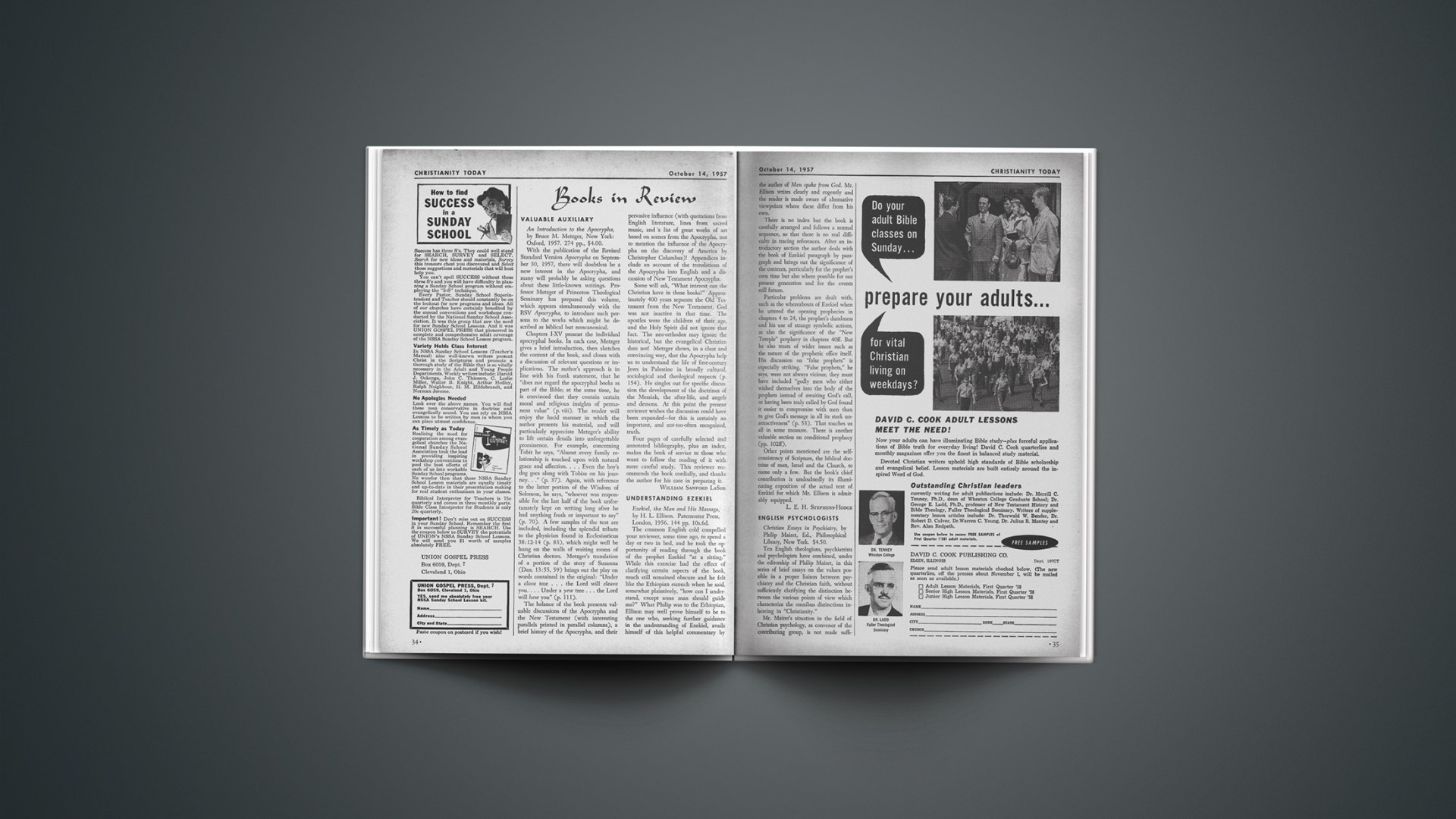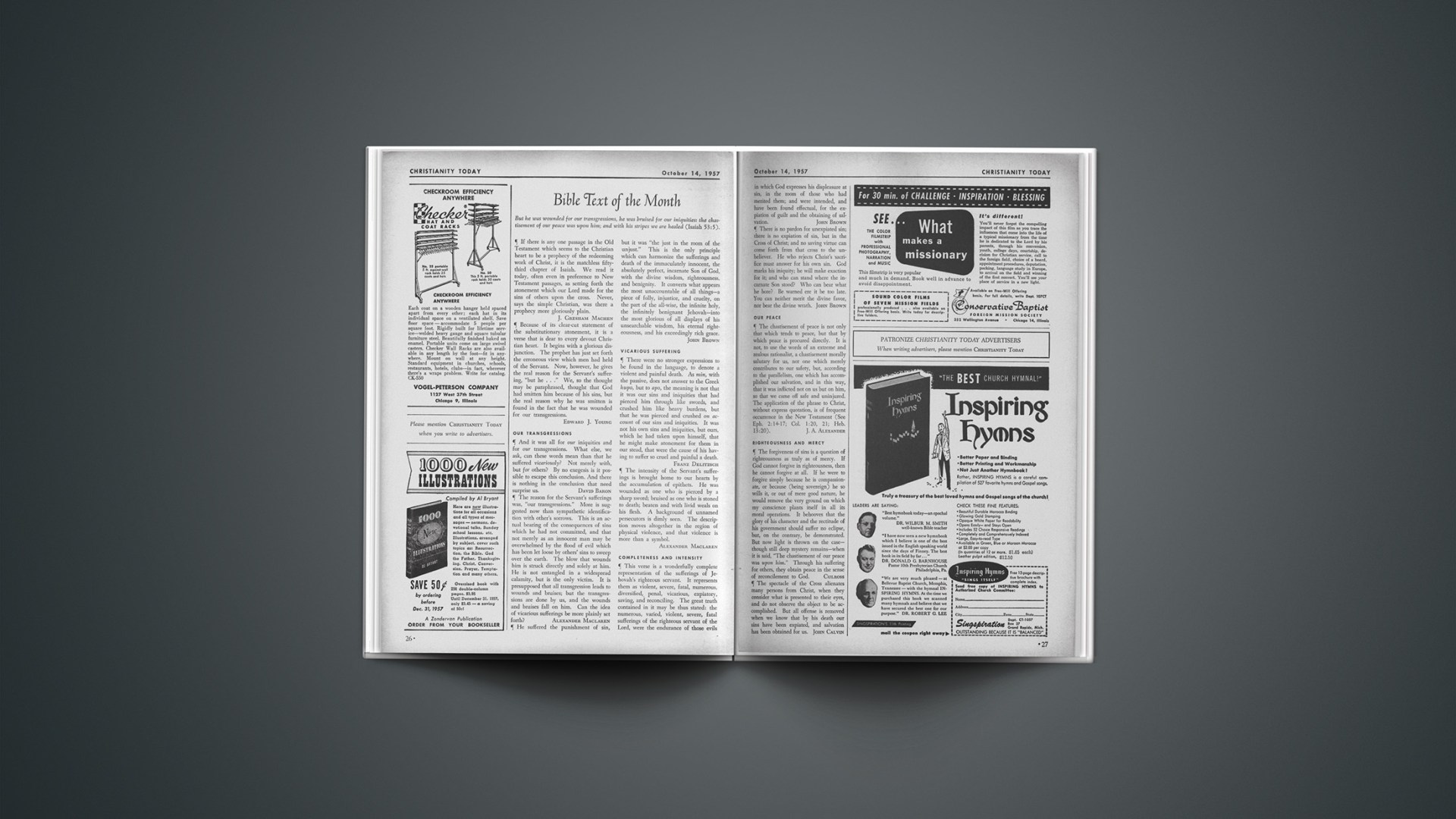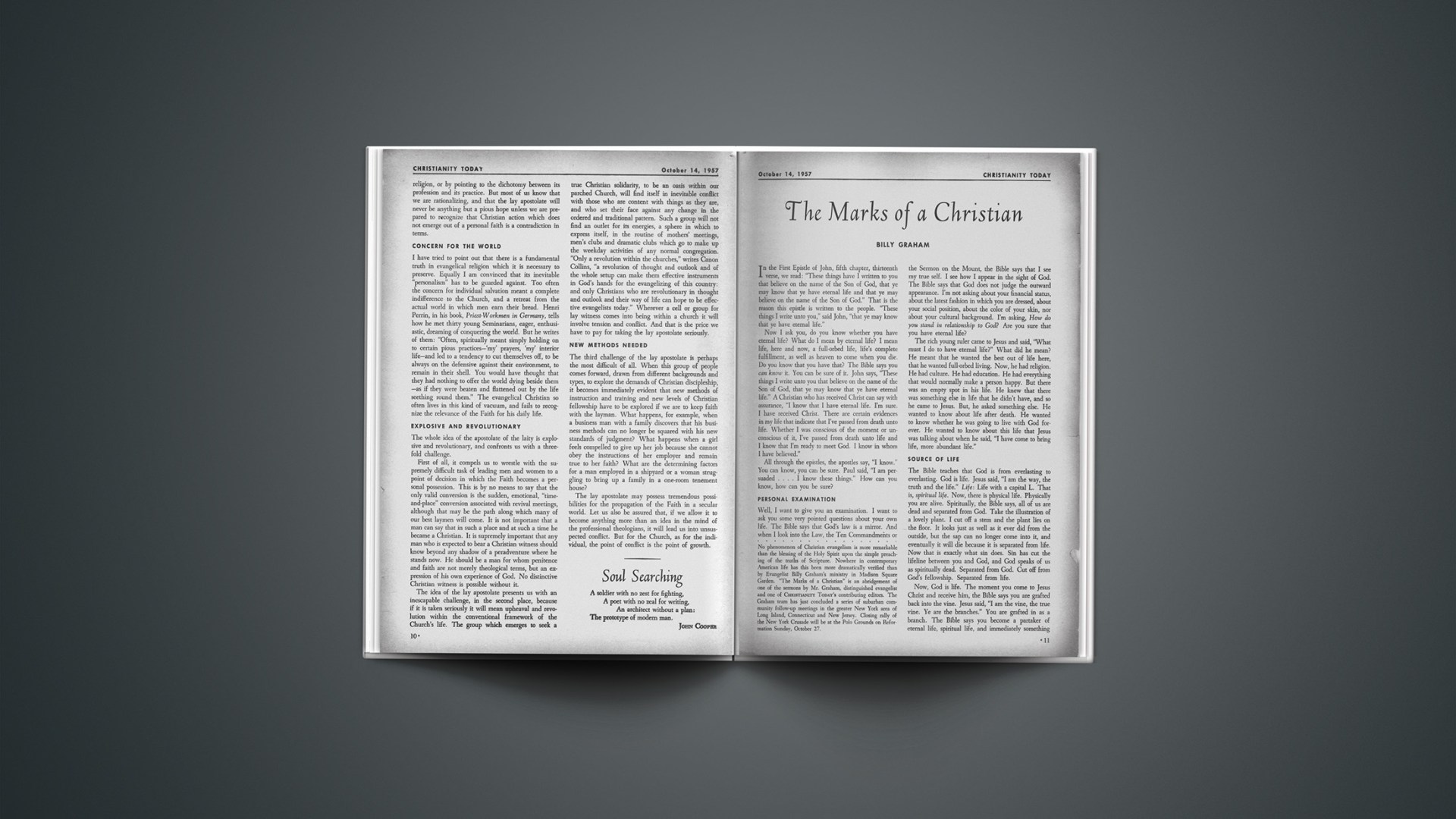Valuable Auxiliary
An Introduction to the Apocrypha, by Bruce M. Metzger, New York: Oxford, 1957. 274 pp., $4.00.
With the publication of the Revised Standard Version Apocrypha on September 30, 1957, there will doubtless be a new interest in the Apocrypha, and many will probably be asking questions about these little-known writings. Professor Metzger of Princeton Theological Seminary has prepared this volume, which appears simultaneously with the RSV Apocrypha, to introduce such persons to the works which might be described as biblical but noncanonical.
Chapters I–XV present the individual apocryphal books. In each case, Metzger gives a brief introduction, then sketches the content of the book, and closes with a discussion of relevant questions or implications. The author’s approach is in line with his frank statement, that he “does not regard the apocryphal books as part of the Bible; at the same time, he is convinced that they contain certain moral and religious insights of permanent value” (p. viii). The reader will enjoy the lucid manner in which the author presents his material, and will particularly appreciate Metzger’s ability to lift certain details into unforgettable prominence. For example, concerning Tobit he says, “Almost every family relationship is touched upon with natural grace and affection.… Even the boy’s dog goes along with Tobias on his journey.…” (p. 37). Again, with reference to the latter portion of the Wisdom of Solomon, he says, “whoever was responsible for the last half of the book unfortunately kept on writing long after he had anything fresh or important to say” (p. 70). A few samples of the text are included, including the splendid tribute to the physician found in Ecclesiasticus 38:12–14 (p. 83), which might well be hung on the walls of waiting rooms of Christian doctors. Metzger’s translation of a portion of the story of Susanna (Dan. 13:55, 59) brings out the play on words contained in the original: “Under a clove tree … the Lord will cleave you.… Under a yew tree … the Lord will hew you” (p. 111).
The balance of the book presents valuable discussions of the Apocrypha and the New Testament (with interesting parallels printed in parallel columns), a brief history of the Apocrypha, and their pervasive influence (with quotations from English literature, lines from sacred music, and a list of great works of art based on scenes from the Apocrypha, not to mention the influence of the Apocrypha on the discovery of America by Christopher Columbus)! Appendices include an account of the translations of the Apocrypha into English and a discussion of New Testament Apocrypha.
Some will ask, “What interest can the Christian have in these books?” Approximately 400 years separate the Old Testament from the New Testament. God was not inactive in that time. The apostles were the children of their age, and the Holy Spirit did not ignore that fact. The neo-orthodox may ignore the historical, but the evangelical Christian dare not! Metzger shows, in a clear and convincing way, that the Apocrypha help us to understand the life of first-century Jews in Palestine in broadly cultural, sociological and theological respects (p. 154). He singles out for specific discussion the development of the doctrines of the Messiah, the after-life, and angels and demons. At this point the present reviewer wishes the discussion could have been expanded—for this is certainly an important, and not-too-often recognized, truth.
Four pages of carefully selected and annotated bibliography, plus an index, makes the book of service to those who want to follow the reading of it with more careful study. This reviewer recommends the book cordially, and thanks the author for his care in preparing it.
WILLIAM SANFORD LASOR
Understanding Ezekiel
Ezekiel, the Man and His Message, by H. L. Ellison. Paternoster Press, London, 1956. 144 pp. 10s.6d.
The common English cold compelled your reviewer, some time ago, to spend a day or two in bed, and he took the opportunity of reading through the book of the prophet Ezekiel “at a sitting.” While this exercise had the effect of clarifying certain aspects of the book, much still remained obscure and he felt like the Ethiopian eunuch when he said, somewhat plaintively, “how can I understand, except some man should guide me?” What Philip was to the Ethiopian, Ellison may well prove himself to be to the one who, seeking further guidance in the understanding of Ezekiel, avails himself of this helpful commentary by the author of Men spake from God. Mr. Ellison writes clearly and cogently and the reader is made aware of alternative viewpoints where these differ from his own.
There is no index but the book is carefully arranged and follows a normal sequence, so that there is no real difficulty in tracing references. After an introductory section the author deals with the book of Ezekiel paragraph by paragraph and brings out the significance of the contents, particularly for the prophet’s own time but also where possible for our present generation and for the events still future.
Particular problems are dealt with, such as the whereabouts of Ezekiel when he uttered the opening prophecies in chapters 4 to 24, the prophet’s dumbness and his use of strange symbolic actions, as also the significance of the “New Temple” prophecy in chapters 40ff. But he also treats of wider issues such as the nature of the prophetic office itself. His discussion on “false prophets” is especially striking. “False prophets,” he says, were not always vicious; they must have included “godly men who either wished themselves into the body of the prophets instead of awaiting God’s call, or having been truly called by God found it easier to compromise with men than to give God’s message in all its stark unattractiveness” (p. 53). That touches us all in some measure. There is another valuable section on conditional prophecy (pp. 102ff).
Other points mentioned are the self-consistency of Scripture, the biblical doctrine of man, Israel and the Church, to name only a few. But the book’s chief contribution is undoubtedly its illuminating exposition of the actual text of Ezekiel for which Mr. Ellison is admirably equipped.
L. E. H. STEPHENS-HODGE
English Psychologists
Christian Essays in Psychiatry, by Philip Mairet, Ed., Philosophical Library, New York. $4.50.
Ten English theologians, psychiatrists and psychologists have combined, under the editorship of Philip Mairet, in this series of brief essays on the values possible in a proper liaison between psychiatry and the Christian faith, without sufficiently clarifying the distinction between the various points of view which characterize the omnibus distinctions inhereing in “Christianity.”
Mr. Mairet’s situation in the field of Christian psychology, as convener of the contributing group, is not made sufficiently clear to give any weight to the choice of the contributers as representative of Britishers expert in the field. However, some of them seem to be so located that they must qualify to speak as experts in the British economy. Judged on its common-sense merits the material is full of practical suggestions and should be of value in stimulating further reading in psychiatry.
The contributors are Methodist, Anglican and Roman Catholic, and one is evidently not religiously active. The most provocative paper is that of Erastus Evans, Methodist superintendent active in promoting pastoral psychiatry. He writes on the relation between religious attitude and psychological insight in the successive periods of life. In this he makes use of Jung’s adaptation of the Trinity idea to show how Father, Son and Holy Spirit can be suggestive of concepts found in infancy, when the child is under parental control; maturity, when the individual finds himself as a person and asserts himself free from father dominance; the age of wisdom in the latter years, when the individual has insights, suggestive of the illumination of the Holy Spirit. This was the one essay which included a concept which the others “could not assimilate.”
Other essays include one on current concepts in psychiatry, the religious development of the individual, treating individuals as individuals in psychiatry, theological and psychological aspects in guilt. Eve Lewis, educational psychologist, has a most interesting essay on the development of children’s religious attitudes. This will give some idea of the scope of the volume.
An advantage for the general public is relative freedom from psychiatric nomenclature, so that the book is very readable. It is informative on basic psycho-religious concepts, and is not polemic. What the reader will obtain from reading this brief volume will depend upon his familiarity with the nomenclature of the psychologist and even more upon his insights. A thoughtful person can hardly put the book down without resolving to read more on the subject.
The book contains a good digest of the views of Adler, Freud, Jung and Kretschmer, and enough explanation of the essential varieties of mental illness as they affect the psychiatrist’s techniques is presented provocatively. The basic distinctions between guilt as conceived by the theologian and the usual approach of the psychiatrist is handled by a Roman Catholic with discernment. The book’s chief value is in stimulating further reading in the vast field and in nicely summating some basic psychiatric concepts.
WALTER VAIL WATSON
Religious-Social Interaction
Protestant and Catholic, Religious and Social Interaction in an Industrial Community, by Kenneth W. Underwood, Beacon, 1957. $6.00.
This pioneer work in its field is a detailed objective and scientific sociological study of the interaction of the Roman Catholic and Protestant churches with each other and with political, economic, social and intellectual elements of culture in the daily life of an industrial community. The deep involvement of religious loyalties in the daily life of an urban culture and basic assumptions of these churches as to the nature of the church and society are described clearly.
This study grew out of the Roman Catholic opposition to a lecture on planned parenthood by Margaret Sanger in Holyoke, Massachusetts, in the fall of 1940 in the First Congregational Church. The lecture had to be held in a labor union hall because of the opposition and Protestant alarm over the success of the Roman Catholic Church in this instance prompted this study.
Underwood describes the incident in detail in the first part of the book in order to point up the importance of understanding the interaction of religion and life. The second part is devoted to a study of the role of the church in salvation, doctrines, worship, the authority of religious leadership, organization, money-raising techniques and methods of property-holding.
In each of these areas Protestant and Roman Catholic views are contrasted and their mutual interactions are set forth. A helpful appendix (pp. 386–389) charts the doctrinal differences of these bodies. The final section relates the influence of these churches in recreation, business, labor, politics, reform and ethnic groups in Holyoke which has in recent years become a dominant Roman Catholic community.
The author’s conclusions are less weighty than might have been expected in so objective and massive a study as this. Protestants, according to him, conceive the nature of community to be plurality and seek “vital diversity of religious and social groups” (p. 367), but the Roman Catholic Church views it in terms of acceptance of ecclesiastical authority in all areas of life even though it faces ethnic and class divisions within its own ranks.
Advanced degrees in journalism, sociology and theology have aided the author in keeping the book scientific and objective.
He has used only primary oral and written sources of information which he lists in a massive bibliography. The reader’s understanding is increased by full footnotes (which unfortunately are placed at the end of the book), an appendix on his methodology, helpful statistical tables and clear simple maps of Holyoke.
The book will appeal both to those interested in an exhaustive case study of sociology of religion and those who are interested in the practical problem of the relationship of Roman Catholicism and Protestantism in a democratic society. Those represented in the latter group may find themselves in disagreement with the apparent inclusivism of the author’s conclusions.
EARLE E. CAIRNS
Symposium Of One
Christianity and World Issues, by T. B. Maston, Macmillan, New York, 1957. $5.00.
In this century Christianity, the church and individual Christians have plenty of world issues with which to occupy their minds. Those discussed in this book include the effects of modern divorce on the family and the race problems in our country, but more space is given to economics and war.
The author’s opinions on these world issues are not always clearly stated. He sketches various views and rarely argues in favor of any one. The method makes use of frequent quotations: so and so said this; somebody else said that. This indirect method is pursued still further. For example, a quotation from John C. Bennett is used to give us Niebuhr’s position (p. 24), and “Norman Pittenger suggests (!) that someone has remarked …” (p. 307). Eventually this dependence upon other author’s assertions becomes wearisome. Does Dr. Maston accept the sentiments he quotes? Sometimes he does not; much of the time, one cannot tell.
Although no conclusion is discernible with respect to the problem of divorce as it confronts ministers who are asked to marry divorced persons, and although the author assumes without argument that certain procedures relative to the race problem are advantageous, his views on economics, communism and war can somewhat be guessed from the turns of expression and the favorable or unfavorable connotations of words.
Apparently he wants the church to reject both communism and laissez-faire capitalism. Communism, however, seems to be condemned more for its methods than for its aims. One senses a strain of embarrassment that communistic brutality should have received such widespread publicity.
True, the author condemns godless materialism; but planned economy whether in Russia or in the U.S.A. is merely a matter of degree. Free enterprise and its opposite are merely matters of labels (p. 143).
In fact, Christianity is a source of communism because it has a messianic eschatology and because it practiced communism in Jerusalem (p. 155); but there is no historic relation between the two (p. 156); yet the roots of modern communism go back to Christian communism (p. 157).
There is no adverse criticism of communistic economics—no criticism of the labor theory of value, or the theory of surplus value, and not much of a defense of private property. “There may not be a great deal of difference between the ultimate goal or hope of the Christian and the communist for society” (p. 184).
Since communism is so close to Christianity in aim, though drastically different in method, it would be wrong to engage in war to rescue the captive nations. The author is generally pacifistic. “A major duty of Christians is to do everything possible to support and strengthen” the United Nations (p. 266); and he seems to entertain the hope of world peace by human efforts without messianic intervention.
These are bare assertions without argument; no attempt is made to base them on the Bible. “War accomplishes nothing” (p. 288); at least modern war, as distinguished from the American Revolution and the Civil War, settles little, if anything (p. 289). Can we not therefore conclude that it would have been better to allow Hitler to conquer the world?
The great defect of the book, and the probable cause of its frequent inconclusiveness, is that no firm foundation of argument is selected. The opinions are impressionistic. They are not founded on scriptural revelation for no clear notion of the role of the Bible emerges. Several times the author appeals to “the centrality of the cross,” but the phrase remains ambiguous. “Can any crucifixion [including Christ’s?] be identified with the cross? No … The cross is a symbol of self-denying, suffering, redemptive love.… It means the giving of oneself in the interest or on behalf of others”(p. 338).
The cross! But where is Christ?
GORDON H. CLARK











